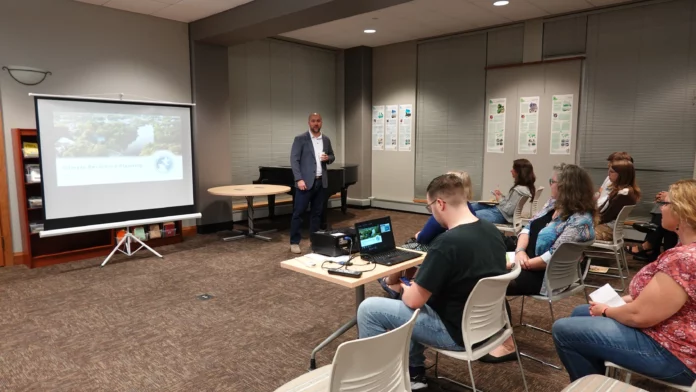
On Nov. 7, the Department of Geography, Planning, and Sustainability hosted Rowan’s first World Town Planning Day to discuss climate-resiliency planning.
“Climate resiliency planning is a planning process that helps communities survive and thrive by addressing climate-related stresses and shocks,” said Mahbubur Meenar, Ph.D., associate professor of Planning in the Department of Geography, Planning, and Sustainability and the director of Community Planning + Visualization Lab at Rowan University.
It has two aspects — planning for climate mitigation and adaptation.
“Climate mitigation efforts are needed to reduce greenhouse gas emissions. Climate adaptation efforts include the understanding and anticipation of the impacts of the climate crisis and taking necessary action to minimize risks and vulnerability. Climate resiliency planning is practiced at the global, national, regional, and local levels,” said Meenar.
The event included two guest speakers, Nick Angarone, the New Jersey chief climate resilience officer and Meghan Wren, the area planner for New Jersey Office of Planning Advocacy.
Nick Angarone talked about how the impact that Hurricane Sandy had on New Jersey was the catalyst for climate change planning in New Jersey. New Jersey is one of the fastest-warming states, and precipitation patterns in the state have changed as well. In the last decade, precipitation levels have increased by 10%, and we’re seeing more rain in a shorter period of time, also called flash storms.
He told an audience of 50 people that the sea level will rise by 5 feet by the end of the century. It’s inevitable, which is why planning for the future is crucial to the sustainability of the planet.
In 2019, Gov. Phil Murphy issued Executive Order No. 89, which was the first time the executive branch of New Jersey declared it is a priority for state agencies to address and respond to the effects of climate change.
“It’s not just about how hot it’s going to be and who’s going to get wet. We have to really think about what the impacts are going to be to our communities and those who make up our communities. Right? What are the actual impacts going to be on the people,” said Angarone.
Each of the 564 municipalities in New Jersey are able to decide what their plan can look like based on their environment and its needs.
“That’s where the municipalities can get away with [not having a plan]… There would be a shift if New Jersey changed that,” said Aedan Rosolia, 19, a community & environmental planning and music major at Rowan University. “We should definitely implement this in our own campus plan.”
Rowan University does have a Roadmap to a Sustainability Master Plan. The roadmap includes many sustainability actions and topic areas.
“There are climate and resilience-related topic areas like developing a greenhouse gas inventory for the university, assessing the impacts of future climate hazards,” said Meenar. “And developing a climate resilience plan to prepare for climate hazards… More students and faculty need to be engaged in this process.”
Meghan Wren’s work revolves heavily around plan endorsement, which is a way municipalities are forced to think of resiliency. It’s a requirement for municipalities to add what their vulnerability to climate change is.
“It’s hard to force communities to think about these things… It seems like the further south you get sometimes… there’s less consideration, less understanding of some of the science behind what’s actually happening,” said Wren.
With the state adding legislation, the counties are being held accountable in the planning of our environment’s future.
“Today’s planning students will become future planners in their communities, so they need to be mentally prepared to become advocates and disseminate the knowledge that they are getting at the school to the community members who don’t have access to such resources,” said Meenar.
For comments/questions about this story tweet @TheWhitOnline or email thewhit.newseditor@gmail.com





